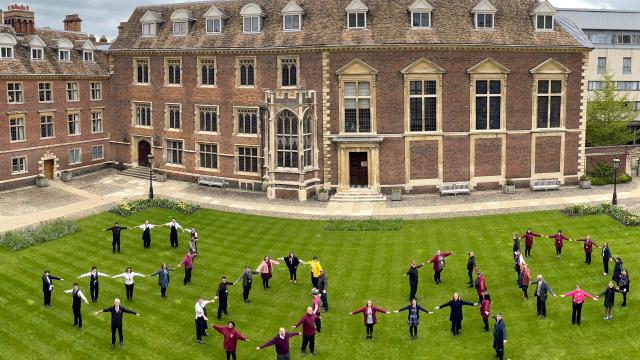
A St Catharine's Fellow is leading an international consortium of researchers in a collaboration with participation from Mass General Brigham, Asher Orion Group and Rhino Health to develop novel diagnostic tools for Birt-Hogg-Dube (BHD) Syndrome, a rare genetic disorder affecting skin, lungs and kidneys.
This multi-national research project brings together clinicians who specialise in rare diseases, led by Professor Stefan Marciniak (2011), with computer scientists and specialists in medical devices and AI. This groundbreaking research, supported by a grant from the Myrovlytis Trust, will use clinical data from the University of Cambridge and Mass General Brigham to build an artificial intelligence (AI) solution in collaboration with Asher Orion Group on a trusted federated learning platform provided by Rhino Health. This cutting-edge machine learning (ML) technique allows for the creation of AI algorithm models using data distributed across geographically disparate locations, without the data ever leaving the individual institutions.
Professor Marciniak is Professor of Respiratory Science and Director of the Cambridge MB/PhD Programme at the University of Cambridge, as well as Principal Investigator at the Cambridge Institute for Medical Research. He commented:
“BHD is a complex disease that can be challenging to diagnose. By leveraging federated learning, we hope to develop accurate and efficient diagnostic tools that can be used by both specialists and non-specialists alike.”
Challenges in rare disease research
To develop robust AI models for rare diseases that can improve both the diagnosis and the healthcare of patients with rare diseases, it is important to train the models on diverse data sets from multiple institutions, across disparate geographies, representing many patient types.
Rare disease research to diagnose and treat conditions like BHD is often hampered by the limited availability of data. Traditional ML methods typically require large datasets for training. Finding and curating those datasets for developing healthcare applications is difficult and is much harder for rare-disease use cases because the data are fewer in number, are in many locations, and contain sensitive information. Because rare diseases are often un-diagnosed, there is also the issue that these data may not exist.
The long-term goal of this research consortium is to see the realisation of a federated and privacy-preserving way to create a rare-disease AI tools that can then be deployed by any health system so that these conditions may be more often detected, without the need for specialised experts everywhere.
John F. Kalafut PhD, CEO of Asher Orion Group, said:
“This is a unique opportunity to combine expertise from across the globe, both clinicians and computer science expertise. We strive for the day when all physicians and care-teams can access and use the power of computational innovations for patients’ quality of life regardless of their geographical location and socio-economic status. In my career, I have participated in and led several international consortia charged with developing medical AI innovations. Based on those experiences, I can affirm that this research can serve as a model for future research into rare diseases.”
Dr Ittai Dayan, co-founder & CEO of Rhino Health, added:
“Federated learning offers a powerful solution to the challenge of data scarcity in rare disease research. By scaling data between different academic and non-academic centres, we can unlock the potential of this data to develop new diagnostics”.
About the collaborators
The Myrovlytis Trust is a charity (UK Charity Commission number 1122073) founded in 2007, with an aim is to transform the outlook for rare conditions. With an initial focus on BHD and osteosarcoma, the trust strategically funds research directed towards new treatments. To learn more, visit myrovlytistrust.org.
Asher Orion Group is a digital health and medical AI solutions and advisory firm. With more than 30 regulated enterprise products brought to market, an additional 8 co-developed medical AI solutions, they are a recognised global leader helping organisations build their healthcare AI products and market strategies. To learn more, visit asheroriongroup.com.
Mass General Brigham is a not-for-profit, integrated health care system that engages in medical research, teaching, and patient care. It is the largest hospital-based research enterprise in the United States, with annual funding of more than $2 billion. It is also an educational institution, founded by Brigham and Women's Hospital and Massachusetts General Hospital.. To learn more, visit massgeneralbrigham.org.
Rhino Health is activating the world’s data through federated computing. The company is headquartered in Boston, with an R&D centre in Tel Aviv. Visit rhinohealth.com to learn more.





